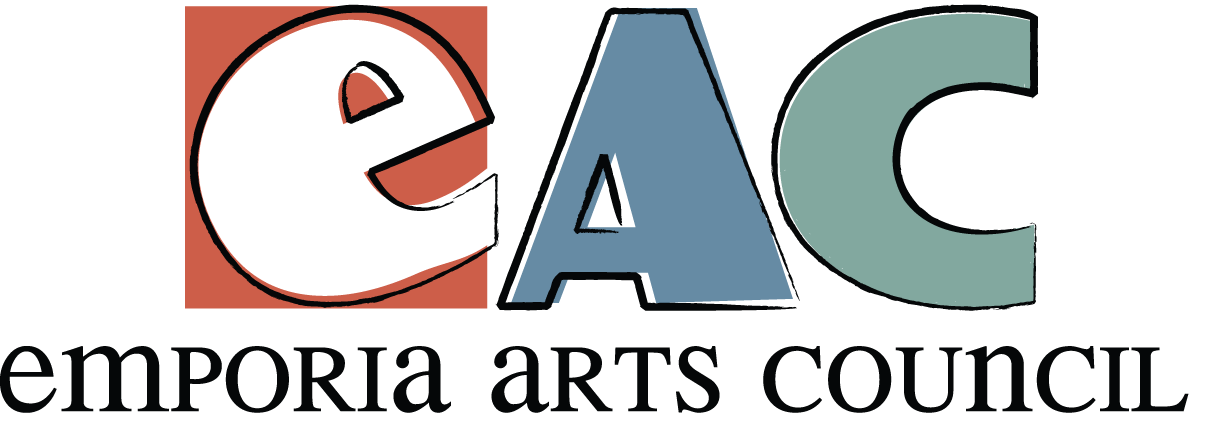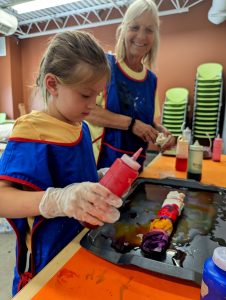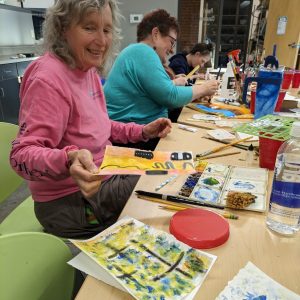Let’s get creative!
The Emporia Arts Center offers year-round art classes for all ages in our state-of-the-art facilities! Specialized classes are lead by trained professionals and are offered in our three multi-purpose classrooms: The Reeble Classroom, Harry’s Classroom and Paula’s Classroom; as well as our Humphrey’s Clay Studio.
Youth Art Education is a crucial aspect of fostering creativity, self-expression, and critical thinking skills in young people.
- Creativity and Self-Expression: Art education encourages children to explore their creativity and express themselves through various mediums such as painting, drawing, sculpture, music, dance, and theater.
- Critical Thinking: Engaging in artistic activities helps children develop critical thinking skills as they make decisions about color, composition, form, and meaning in their artwork.
- Problem-Solving: Art projects often require problem-solving skills, such as figuring out how to translate an idea into a tangible piece of art or overcoming technical challenges.
- Cultural Appreciation: Art education exposes children to different cultures, traditions, and perspectives through the study of art history and exposure to various artistic styles and techniques from around the world.
- Emotional Development: Creating art can be a therapeutic outlet for children to express their emotions, process experiences, and develop a greater understanding of themselves and others.
- Social Skills: Collaborative art projects and group activities in art classes help children develop social skills such as communication, cooperation, and teamwork.
- Confidence Building: Success in art projects can boost children’s self-esteem and confidence as they see their ideas come to life and receive recognition for their efforts.
- Cognitive Development: Art education stimulates various areas of cognitive development, including sensory perception, spatial awareness, fine motor skills, and memory.
- Lifelong Appreciation for the Arts: Exposure to art at a young age often fosters a lifelong appreciation for the arts, whether as creators, consumers, or supporters of the arts in their communities.
Adult Education is just as important as youth art classes
- Lifelong Learning: Art education for adults provides opportunities for continued growth, exploration, and skill development.
- Stress Relief and Mental Health: Engaging in art can be a therapeutic outlet for adults, offering a way to unwind, reduce stress, and improve overall mental well-being. Many adults turn to art as a form of self-expression and relaxation.
- Creative Outlet: For many adults, especially those in demanding professions, art provides a much-needed creative outlet. It allows them to tap into their imagination, experiment with new ideas, and pursue interests outside of their everyday responsibilities.
- Community and Connection: Art classes and workshops create opportunities for adults to connect with like-minded individuals, build friendships, and form supportive communities centered around a shared passion for creativity and expression.
- Skill Enhancement: Whether someone is a complete beginner or an experienced artist, adult art education offers opportunities to refine existing skills and learn new techniques. This can be particularly valuable for adults looking to pursue a career change or simply improve their artistic abilities.
- Personal Growth: Learning art as an adult can be a journey of self-discovery and personal growth. It encourages individuals to push past their comfort zones, embrace experimentation and failure, and develop resilience in the face of artistic challenges.
- Personal Fulfillment: Ultimately, adult art education is about nurturing a sense of personal fulfillment and joy through creative expression. It reminds adults that it’s never too late to pursue their artistic passions and find meaning and purpose through art.


